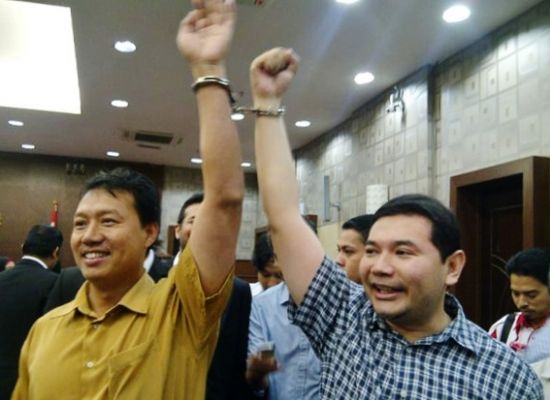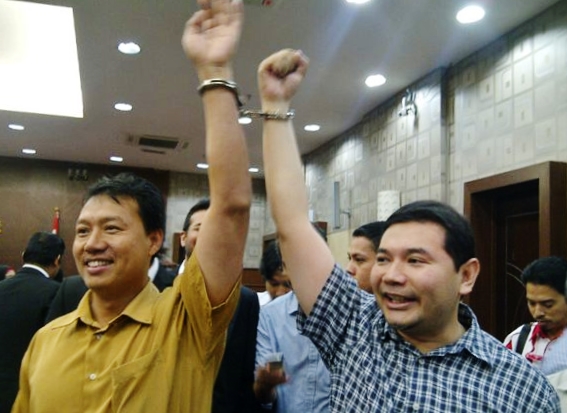In our Selected Exhortations category, we republish interesting stuff such as must-read articles and essays not originally written exclusively for the blawg, and which have come to our attention. Please feel free to email [email protected] if you would like to reproduce your writing, but first follow our Writer’s Guide here.
This is an opinion piece by Foong Li Mei published by not-for-profit research institute REFSA (Research for Social Advancement) on Monday, 13 August 2012.

The click of handcuffs upon the wrists of Rafizi Ramli and former bank clerk Johari Mohamad in the wee hours of 1 August was a rude awakening to Malaysians. The Whistleblowers Protection Act is now blowing in the wind as we watch the duo being prosecuted under the Banking and Financial Institution Act (BAFIA) for revealing confidential documents, although these papers shed light on the abuse of public funds popularly known as Cowgate [1].
The eruption was immediate – the Malaysian public severely condemned the charges as a high-handed act of the Barisan Nasional (BN) federal government to silence allegations of abuse of taxpayers’ funds. Further cementing the view was Rafizi’s ongoing exposé on the shady goings-on underlying the billion-ringgit Ampang LRT line extension project [2].
However, the rakyat’s support for the whistleblowers lost a little gusto when Selangor Menteri Besar Tan Sri Khalid Ibrahim announced that the state will use a ‘whistleblowers fund’ to bear Rafizi’s legal costs [3]. A conundrum was plunged right into the middle of the confab – is it fair to come to the aid of Rafizi with public funds?
The debate currently centers around three raging questions:
- Should the Selangor government use public funds to protect Rafizi, who also happens to be the strategic director of Parti Keadilan Rakyat (PKR), a component party of the Pakatan Rakyat coalition that governs the state?
- Does Rafizi still deserve protection after he violated the Whistleblower Protection Act 2010 (WPA)?
- Does the prosecution of Rafizi stem from BN’s personal ‘vendetta’ against the PKR leader?
Many views have been aired and arguments rage on, but we are, unfortunately, no closer to solving the conundrum of whether taxpayers should help with Rafizi’s legal costs. Poet Edward Hodnett would diagnose our stagnancy as due to not having asked the right questions.
We submit that the Root Question is – Does the end justify the means?
Rafizi had, indeed, brandished confidential documents in exposing the beef valley scandal. But the meat of the matter, so to speak, lies in whether the result of Rafizi’s violation of BAFIA outweighed the flouting of the law. In this case, the only apparent harm from Rafizi’s illegal act was to National Feedlot Corporation (NFCorp) executive chairman Datuk Seri Mohamed Salleh Ismail, who has been charged for criminal breach of trust and violating the Companies Act [4].
If Rafizi had kept the documents in the dark for fear or respect of BAFIA, the Cowgate hanky-panky might never have come to public knowledge, let alone charges being pressed. The PKR strategic director’s exposé had brought a crime to light.
Does this end justify Rafizi’s breaking of BAFIA? If the rakyat agrees that Rafizi was justified, then the answer is crystal clear to the raging question:
Raging Question #1: Should the Selangor government use public funds to protect Rafizi, who also happens to be the strategic director of PKR, a component party of the Pakatan Rakyat coalition that governs the state?
The rakyat’s reluctance of being dragged into, and worse, paying for, party fracas is understandable. Any political agenda has gained a perception of being dirty and self-serving, and skeptics see such actions as just exercises in vote-fishing.
However, the revelations of the NFC (National Feedlot Center) scandal debunked these assumptions. People saw red in this case not because Pakatan Rakyat was attempting to manipulate perceptions. Malaysians with a basic grasp of integrity had no trouble recognising that it was downright wrong for NFC directors to use taxpayers’ money for personal purchases of luxury condos, glitzy cars and expensive getaways.
In other words, Rafizi exposed misconduct. His political loyalties were irrelevant. Whatever his motivations may have been, it does not write off the fact that he cast a spotlight on the arrogant unscrupulous who were mucking with Malaysians’ hard-earned ringgits. Even if his party did stand to gain from BN’s disgrace, Rafizi did not do it at the cost of the rakyat. Quite the reverse, it was actually a service to the rakyat bringing these shenanigans to light.
This also renders the following raging question moot:
Raging question #2: Does Rafizi deserve protection after he violated the Whistleblower Protection Act 2010 (WPA)?
Detractors point out that the PKR strategic director and the former bank clerk did not qualify for whistleblower protection because their disclosures were not made to an enforcement agency such as the police or the Malaysian Anti-Corruption Commission (MACC). Instead, they made their revelations to the press.
However, lawyers have explained that even if the duo had reported to an enforcement agency, they would still not have been protected as the WPA does not provide immunity to revelation of matters prohibited by existing laws, such as BAFIA and the Official Secrets Act (OSA) [5].
Should Rafizi and Johari have just forgotten about the whole thing then? The fault evidently lies more in the Whistleblower Protection Act, which now appears increasingly a misnomer since its protection ceases to come in effect in circumstances when the whistleblowers would need it most, such as when revealing confidential documents as proof of misdeeds.
If Rafizi’s revelation can be taken as evidence in the prosecution of NFCorp’s abuse of public funds, then we should defend his immunity to prosecution. After all, isn’t the whole point of justice to punish the unscrupulous and uphold the righteous?
Equally futile is the obsession indicated in the next question:
Raging question #3: Did the prosecution of Rafizi stem from BN’s personal ‘vendetta’ against the PKR leader?
We believe just as Rafizi’s party post is irrelevant to his contribution as a whistleblower, BN’s interest should also not dominate the discussion. The issue at hand is that Rafizi did violate BAFIA. No matter how much good his exposé did for Malaysians, he is still legally liable to answer for the violation, under current law.
However, do note that the Attorney-General (AG) can choose not to prosecute. There are precedents. For example, a widely-circulated video that showed then-Health Minister Datuk Seri Dr Chua Soi Lek having sexual intercourse with a woman who was not his wife. The duo were engaged in fellatio (oral sex), which is a crime under Section 377A of the Penal code [6] – the same law under which opposition leader Datuk Seri Anwar Ibrahim was charged for alleged sodomy [7]. Chua had publicly admitted that he was the man in the video and subsequently resigned as minister. However, he was not prosecuted by the AG for his bedroom behaviour that contravened the Penal Code.
The AG did not give any reasons for not proffering charges against Chua, even though Chua had publicly admitted to the illegal sexual act. But if a case such as Chua’s can be ignored by the AG, surely Rafizi can be spared charges as well? After all, Rafizi’s violation of BAFIA actually served the public interest, and, as mentioned, the only ‘hurt party’ here is Salleh, who has already been charged in court.
The questions we should focus on instead are:
1. Will the Selangor state government extend its whistleblower aid to all Malaysians?
REFSA notes that the state government has been silent about Johari’s legal costs. Johari should be entitled to the whistleblower fund as well, being a key person in the exposé. Excluding him from the aid may diminish trust in the Selangor state government’s sincerity to help all whistleblowers and not just members of its coalition parties.
2. How can current laws be revised to uphold efforts in fighting graft, corruption and abuse of power?
It is pertinent to focus critical lens on whether our legal system provides harbour for the corrupt. The WPA should have granted Rafizi and Johari immunity from prosecution under BAFIA. Just as the largely-peaceful Bersih 3.0 rally exposed the absurdity of the Peaceful Assembly Act, the charges against these two whistleblowers in the Cowgate scandal dragged the weaknesses of the WPA into the light.
At the end of the day, both Rafizi Ramli and NFCorp have to answer to charges, based on existing legislation. None of us is above the law, but being below it has its advantages – it makes it so much easier for us to spot the bad leg it stands on.
Let’s remember that laws are man-made and can be amended and refined to address weaknesses and meet changing circumstances. The debate over Rafizi’s prosecution ultimately boils down to whether the charges against him truly serve the purpose of justice. If they do, the status quo can remain.
However, if justice is not served in the prosecution of Rafizi, then our efforts should be directed towards amending the appropriate laws, as well as making our opinions known to the Attorney-General that in this case, no prosecution is the appropriate choice.
______________________________________________________________________
[1]“Rafizi charged under banking law”. (Retrieved 6 August 2012).
[2] “George Kent clinches lucrative Ampang LRT deal”. (Retrieved 6 August 2012).
[3]“Selangor to pay Rafizi’s legal costs”. (Retrieved 6 August 2012).
[4]“Shahrizat’s hubby charged with CBT in NFC scandal”. (Retrieved 6 August 2012).
[5]“Whistleblower Act flawed, say lawyers”. Available at http://bit.ly/P6P6nv (Retrieved 6 August 2012).
[6] “Dangerous Liaisons”. (Retrieved 8 August 2012).
[7] “Oral sex: Anwar’s lawyer raps AG for not charging Soi Lek”. (Retrieved 8 August 2012).
Download the PDF document
Click here for more REFSA Says articles.
Visit us at http://refsa.org | Like us on our Facebook page | Follow our tweets @inforefsa


Nice!